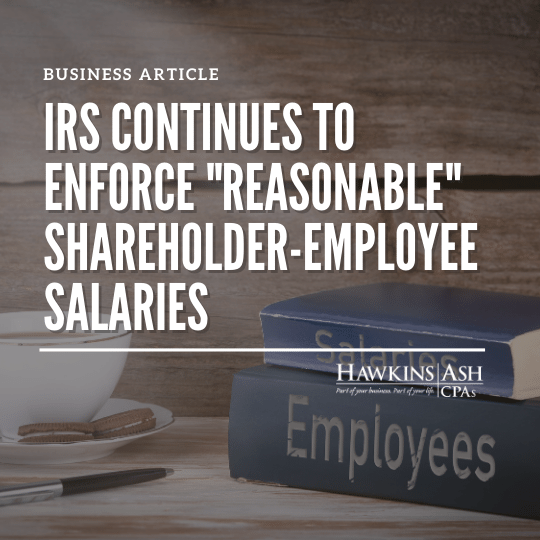If you’re a shareholder-employee of an S corporation, you more than likely considered the tax advantages of this entity choice. But those very same tax advantages also tend to draw IRS scrutiny. And the agency has made clear that its interest in S corporations – including possible audits – will continue.
What’s The Problem?
The IRS pays particular attention to S corporations because, as you well know, shareholder-employees of these organizations aren’t subject to self-employment taxes on their respective shares of the company’s income. This differs from, say, general partners in a partnership.
To better manage payroll taxes, many S corporations minimize shareholder-employee salaries (which are subject to payroll taxes) and compensate them mostly via “dividend” distributions. If this holds true for you, the IRS may take a close look at your salary to determine whether it’s “unreasonably” low. The agency views overly minimized salaries as an improper means of avoiding payroll taxes.
If its case is strong enough, the IRS could recharacterize a portion of distributions paid to you and other shareholder-employees as wages and bill the employer and/or employee for unpaid taxes, interest and possibly even penalties.
How Do You Define It?
By following certain guidelines, your business can ensure salaries paid to you and other shareholder-employees have a higher likelihood of meeting the agency’s typical standards of reasonableness.
For starters, do some benchmarking to learn how S corporations of similar size (as indicated by capital value, net income or sales) in your industry and geographic region are paying their shareholder-employees. In addition, pay close attention to certain traits held by your shareholder-employees. These include:
- Background and experience
- Specific responsibilities
- Work hours
- Professional reputation
- Customer relationships
The stronger these traits are, the higher the salary should be in the eyes of the IRS. Shareholder-employee salaries should be fairly consistent from year to year, too, without dramatic raises or cuts.
Who Can Help?
As your S corporation battles with its competitors and strives to meet its strategic goals, you may not be thinking all that much about the form of your compensation. But, rest assured, the IRS is paying attention. We can examine the reasonableness of the salaries that you and other shareholder-employees are receiving and help minimize the chances of an examination or audit.





